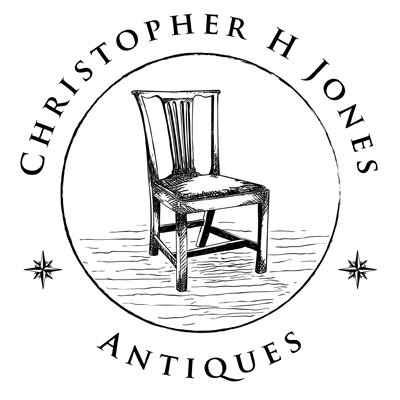
Tooled leather trunk with original cloth interior, circa 1827
Retains original hardware, including iron lock plate, brass and steel lock and hinges.
Original cloth interior with original engraved label
Wood and metal skeleton
Commentary: This trunk retains all of its original components, making it an extraordinary document of early American leather craftsmanship. It is decorated on the exterior with floral and geometric stamped and tooled decoration on the front, sides and top, with incised lines separating the decorative bands. Although clearly used, the trunk survives in excellent condition with all of its original hardware, skeletal components and a beautiful engraved label affixed to the original cloth upholstered interior. The initials of the owner, “ACL” (or AGL) are stenciled on the front and side.
The engraved label depicts a group of trunks on a dock with a sailing ship in the distance. The label reads: “Jesse Hunt, 127 Baltimore Street/Manufacturers Trunks of every description/for Travelling,/Packing/and/Domestic Use./Also Trunks in nests for Exportation-/Orders executed with Promptitude and a liberal-/Discount allowed to those who buy to sell again-/.” The label is further decorated with calligraphic flourishes and sketches of trunks.
Jesse Hunt (1793-1872) was from a family of early settlers in Calvert County, Maryland. His grandfather Job Hunt (d. 1773), a Presbyterian minister, immigrated from Warwickshire to southern Maryland, married Elizabeth Chew (b. abt. 1721) and in 1760 moved his family to Green Spring Valley in Baltimore County. Jesse’s father, also Job Hunt (1771-1809) married Margaret Hopkins (b.1747) in 1771, daughter of Samuel Hopkins of Govanstown. Jesse was born in 1793; the last of 10 children, and his mother died the following year, leaving him to be raised by a sister.
Jesse Hunt apprenticed in the saddlery trade with William and Richard Hall in 1808. The War of 1812 interrupted his apprenticeship and Jesse served as a private in a company known as the Washington Blues, attached to the Fifth Infantry Regiment that took part in the Battle of North Point. He was made a lieutenant after the battle, an office he maintained until 1822.
In 1815 he married Margaret Yundt and struck out on his own, establishing a saddlery and leather goods business in Baltimore at 4 North Charles Street, and lived at 70 Lombard Street. In the 1820 Census of Manufactures for Baltimore City, his listing indicated that he produces “saddles bridles Harness & trunks” and employed three men and two boys. By 1827, Hunt relocated his business to 127 West Baltimore Street, the address on the label of this trunk.
In 1829 Jesse Hunt was elected to the Maryland House of Delegates as a representative of the Jackson party for Baltimore, a position he held for three yearly terms. In 1832, he was elected Mayor of Baltimore and re-elected in 1834. He resigned the post in 1835 after objections were aired to his connections with the failed Bank of Maryland. The failure of the Bank resulted in widespread rioting and the threat of armed insurrections in the city, and Jesse Hunt, aided by a handful of policemen persuaded several groups of citizens to lay down their arms. He returned to the saddlery business but soon after was appointed City Register, managing the city’s finances. He served in this capacity for five terms until he was appointed President of the Eutaw Savings Bank in 1847, a position he held until his death in 1872.
It is possible that Jesse Hunt’s shop served as the location for the apprenticeship in to the trade of two of Jesse’s nephew, Samuel (1817-1896) and Thomas Hunt (dates unknown). Samuel Hunt & Sons became a popular harness and saddle shop in the mid-19th century in Baltimore, and lasted until the great fire of 1904. The shop specialized in harness, saddlery, and traveling trunks.
Jesse Hunt was also credited with organizing the first benevolent association for the relief of the poor in Baltimore. In 1849 he chartered the “Association for the Improvement of the Condition of the Poor”, and served as its President for many years. He also was a member of the Baltimore United Fire Company. Despite the controversies surrounding his mayoralty, he appears to have been considered a just and kind man. In a biographical sketch written in the last year of his life, it was remarked: “(Jessie Hunt’s) social and domestic life was marked by that uniform kindness and courtesy, which commanded the confidence and respect of all without regard to party or sectarian affiliation.”
Price: $3,950.


